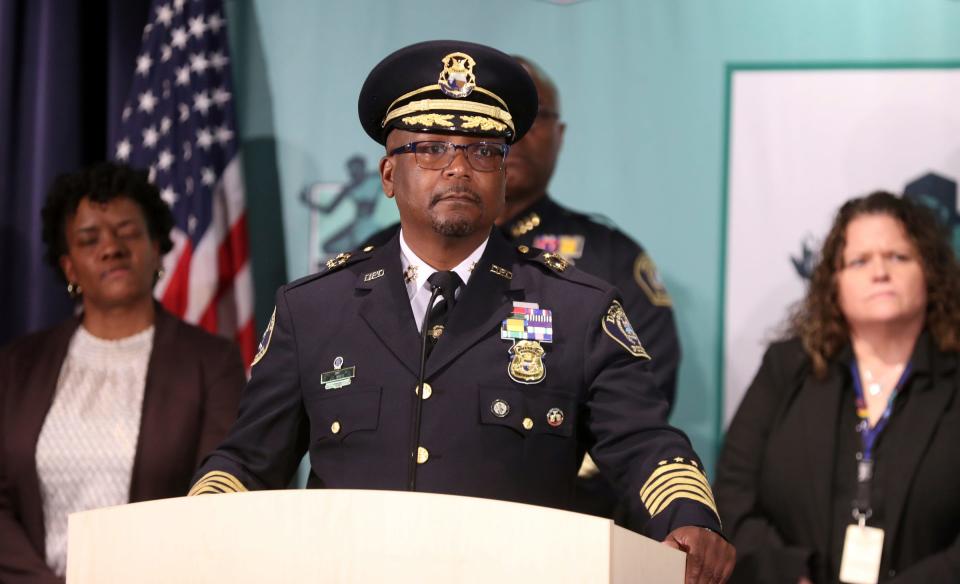Detroit police to routinely release police shooting videos after push from oversight board
Just before the Detroit Police Board of Commissioners voted Thursday to propose a city ordinance that would require police to release video footage of police shootings and other instances of deadly force, Detroit Police Chief James White announced that his department will publicly release such videos within 45 days of each incident.
Videos will be posted on the department's YouTube channel, White said. The Detroit Police Department late Thursday afternoon posted one video of an Oct. 20 nonfatal police shooting, including 911 calls, body camera footage, surveillance footage, and further information and details provided by police representatives.
"As Chief, I hold this department to the highest standards. Standards of service which includes values of integrity, professionalism, and community. This briefing is to ensure our values are met, and that we are transparent about critical incidents," White said at the beginning of the video.

Prior to Thursday, Detroit police voluntarily released body camera footage in some instances, but not others.
The Detroit Police Board of Commissioners on Thursday voted to move its proposed ordinance to city council for a vote. If approved by city council, the ordinance would require Detroit police to release to the public video footage and supplemental reports of police shootings and other instances of deadly force — both fatal and nonfatal — within 12 calendar days of the incident, and without requiring Freedom of Information Act requests.
Supplemental reports include investigative reports, use of force reports and arrest reports.
Under the ordinance, requests could be made by government or law enforcement entities to delay the release of footage and reports, not exceeding an additional 30 calendar days. Footage not owned or controlled by the city would need to be released within 21 calendar days under the proposed law.
Commissioners said if approved, the ordinance would boost transparency and build trust between Detroit police and the community. The BOPC has expressed frustration with Detroit police for not releasing full, unedited body camera footage of the October 2022 police killing of Porter Burks for almost a year, despite repeated requests from the board tasked with holding police accountable to the public.
Five officers shot 38 rounds at Burks in three seconds, fatally striking him 19 times, while the 20-year-old was experiencing a mental heath crisis.
"The people of the City have an undeniable, and in some cases paramount, interest in being informed, in a timely fashion and based on the most accurate information possible, about how their police department conducts its business, especially where the use of force by the police results in the death of, or great bodily harm to, a civilian," the BOPC wrote in its proposed city ordinance.
Chicago and Los Angeles have adopted similar ordinances. In Chicago, body camera footage is required to be released with 60 days of critical incidents like police shootings. In Los Angeles, footage is released within 45 days.
Police Commissioner Linda Bernard wrote in a news release earlier this month that leaving the release of footage to the discretion of police can lead to inconsistencies.
The release of body camera footage "can be within a few hours to more than a year later within the Department’s discretion, if ever," Bernard said. "This internal 'policy' was apparent with the delayed (and obscured) release of the Porter Burks video, despite repeated community protestations, more than one year later."
The BOPC also recommended proposed amendments to the Detroit Police Department's policy on police shooting investigations, which include:
Incorporating other deadly uses of force within the policy.
Requiring police release all raw video and audio footage of a critical incident and to the public within five days without having to go through the Freedom of Information Act, unless prohibited by city, state, or federal law.
Recognizing that the BOPC's police oversight is charter-mandated and that the public is particularly concerned with critical incidents such as police shootings.
Timely notifying the BOPC of critical incidents — within four hours.
A required critical incident debrief, and subsequent updated debriefs, between the chief of police or a police representative and the BOPC within three days of the incident. The debrief would include a "step-by-step account of the incident," video and audio footage, still pictures and more.
DPD would provide the BOPC with quarterly reports that list all critical incidents for "a rolling 3-year period." These reports would include information regarding the officers and the investigation into the incident.
Andrea Sahouri covers criminal justice for the Detroit Free Press. She can be contacted at 313-264-0442 or asahouri@freepress.com.
This article originally appeared on Detroit Free Press: Detroit police chief commits to releasing police shooting videos

